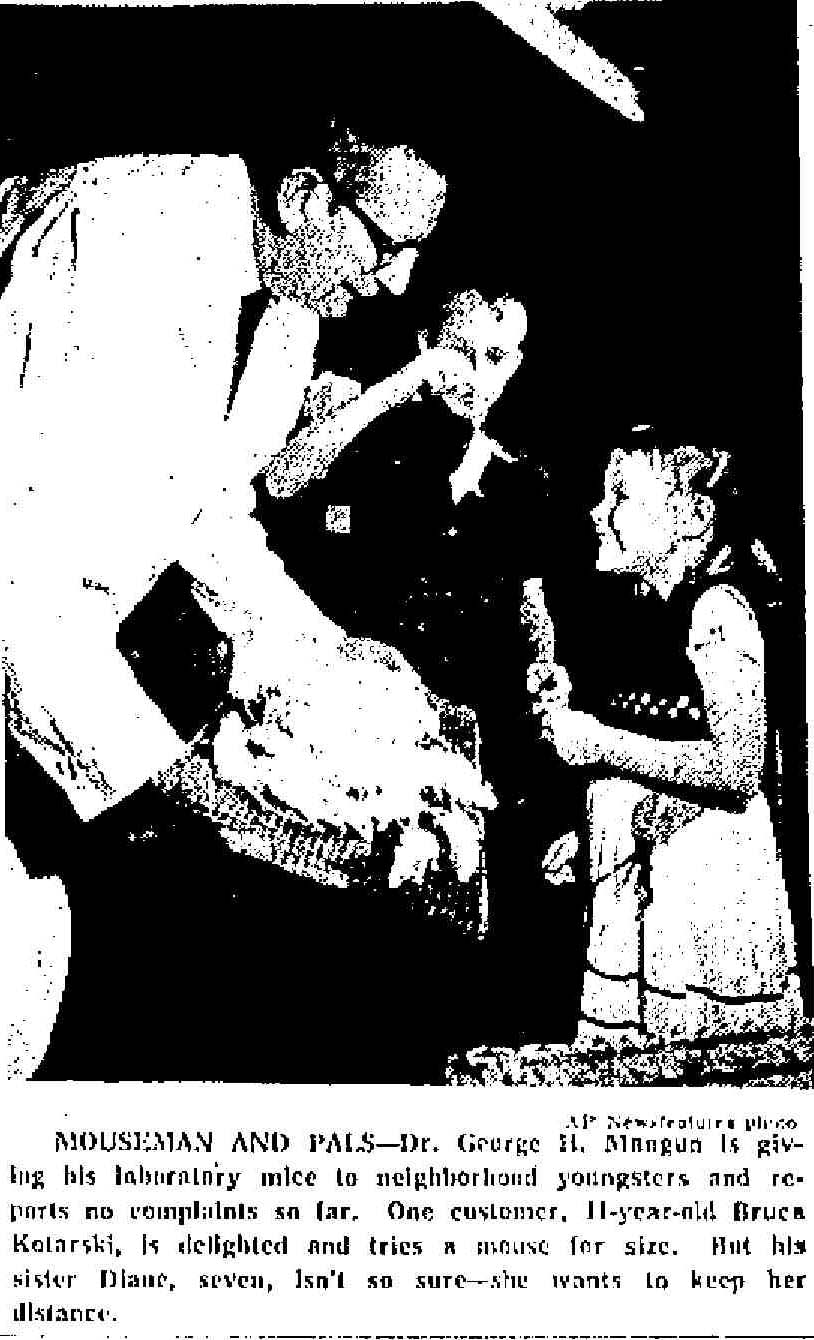Bridgeport Sunday Post
Bridgeport, Connecticut
June 5, 1960
Anyone Want a Mouse or Two?
Biochemist Hands Them Out
By Tom Henshaw
MENDHAM, N.J. -- (AP) If a surprisingly large
number of the nation's crack biologists hail from this vicinity a
couple of decades hence, it will mean that Dr. George H. Mangun
has had his benign revenge on his neighbors.
Dr. Mangun, a 48-year-old biochemist, is moving West -- and
taking his experimental research with him, much to the official
relief of several squeamish neighbors -- but he'll be leaving a
scientific legacy behind him.
The legacy: a colony of 3,000 little white mice which the
doctor has been passing out by the fistful to any youngster who goes
to his barnyard laboratory and asks for them.
Loses Zoning Battle
"It was the kids' idea, really," grins Dr. Mangun,
who fought a losing battle for a year and a half against a zoning
ordinance interpretation that, in effect, bans large-scale
mouse-breeding from the rural confines of Washington valley near
Morristown.
"At first I thought of driving my trail herd through the center of
town on my way West," he says, chuckling. "But then the
neighborhood kids started calling up to ask if they could have a
mouse.
"I decided then and there that my revenge for this town would be to
make biologists out of all the children so they will amount to more
than this generation."
Surprisingly, most of the youngsters told Dr. Mangun they
wanted the mice for serious study purposes, rather than pets.
A number went to Rutger students for home studies, mostly in
genetics. And many went to fledgling scientists in younger age
brackets.
Seventh Grade Project
Jerry Valorant and Kevin Bennett, both 13, picked up
several to use in a special project for the seventh grade of the
Mendham township school.
"I feed mine nourishing food, " says Kevin.
"And I feed mine food that is not nourishing," adds Jerry.
"Mine are healthy," says Kevin.
"Mine are sick," adds Jerry.
"When we get through we're going to write a report for our science
teacher."
Dr. Mangun's experiments, which he has been conducting
independently under a $15,000 a year grant from a pharmaceutical
firm, are a bit more complicated than that. They deal with
basic research into the mysteries of enzymes and pain killing
agents.
The laboratory and mouse colony, set up two years ago in a remodeled
barn, drew complaints almost immediately from a "next door" neighbor
who lives about 300 yards away down a dirt road. The
complaint: Dr. Mangun was conducting a business in a
residential zone. Town fathers agreed.
Has to Move Troupe
Now, Dr. Mangun is negotiating to move his
experiments -- and his wife, three small children, three dogs, two
Nubian goats and a cat -- to Arizona State college at Tempe, where
he'll teach as well as experiment.
Neighborhood youngsters will miss him and his mice. A number
of kids have served as junior assistants in the Mangun lab,
sweeping up, feeding and watering the mice and listening to the
doctor's informal lectures on the care and breeding of mice.
How have the parents of Mendham -- and places as far away as Teaneck
-- taken to the mass dispersal of white mice?
"They've kind of liked the idea of the kids experimenting at home,"
says Dr. Mangun. "I've been giving away a few at a time
for some years and I've never had a complaint. No returns,
either.
"In fact, one parent even dropped around to tell me he liked the
idea because it was teaching his son the facts of life and saving
him a lot of trouble.
"Another youngster went home and told his folks he had learned why a
man was worth more than a woman. He figured that out because
you can mate five female mice to one male.
"Right or wrong, Dad got a new standing in that household."

|


















|

